16th Ogulin Fairy Tale Festival Starts Its Autumn Edition Today
September 10, 2021 - Festivals are not exclusive to spring and summer, and especially when the weather in Croatia continues to be pleasant in the first weeks of September, autumn has a select variety of events and places to visit. One of them is the 16th Ogulin Fairy Tale Festival, which starts today and lasts all weekend.
There is a city in Croatia where characters from fairy tales and legends gather. The town of Ogulin is known as the most fairytale town in Croatia and beyond. Turisticke Price reports that, for the sixteenth year in a row, the Ogulin Fairy Tale Festival will be held, where both children and adults can enjoy fairy tales and fairytale works by artists from all over Croatia all weekend long. This is the time when characters from fairy tales take to the streets of Ogulin and hang out with visitors for three whole days.

(City of Ogulin Tourist Board)
The main part of the program of the 16th Ogulin Fairy Tale Festival is performances of cultural, educational, and entertainment content and the telling of fairy tales by various performers from all parts of Croatia and the world. In addition, there are various art, creative and technical workshops, dance performances, animation programs, concerts, sports events, and from this year, film screenings of films intended for the youngest and a music program.
Visitors can also see certain exhibitions, including exhibitions of birds and small domestic animals. And as befits a festival, there is an offer of various desserts and stands with local products, handmade items, souvenirs, and more.
(City of Ogulin Tourist Board)
You may be wondering how and why Ogulin got the "title" of the most fairytale city? This is due to the beautiful nature of the Ogulin area. As soon as you approach Ogulin, you will see Mount Klek, which looks like a sleeping giant and to which many legends are attached. In the very center of the city is the Frankopan castle, and across from it is Đulin's abyss, and in the background lies the giant Klek. In addition, there are beautiful forests, hills, meadows, fields, caves, rivers, lakes and other beauties.
This beautiful and mystical nature was the inspiration for Ivana Brlić-Mažuranić, the most famous Croatian writer for children who were born in Ogulin. Stories from antiquity is a special collection of her fairy tales that have remained in the wonderful memory of many generations precisely because of their beauty, originality, timeless instructiveness, and whose characters walking through Ogulin you can imagine and see, you just have to awaken your imagination and children's curiosity.
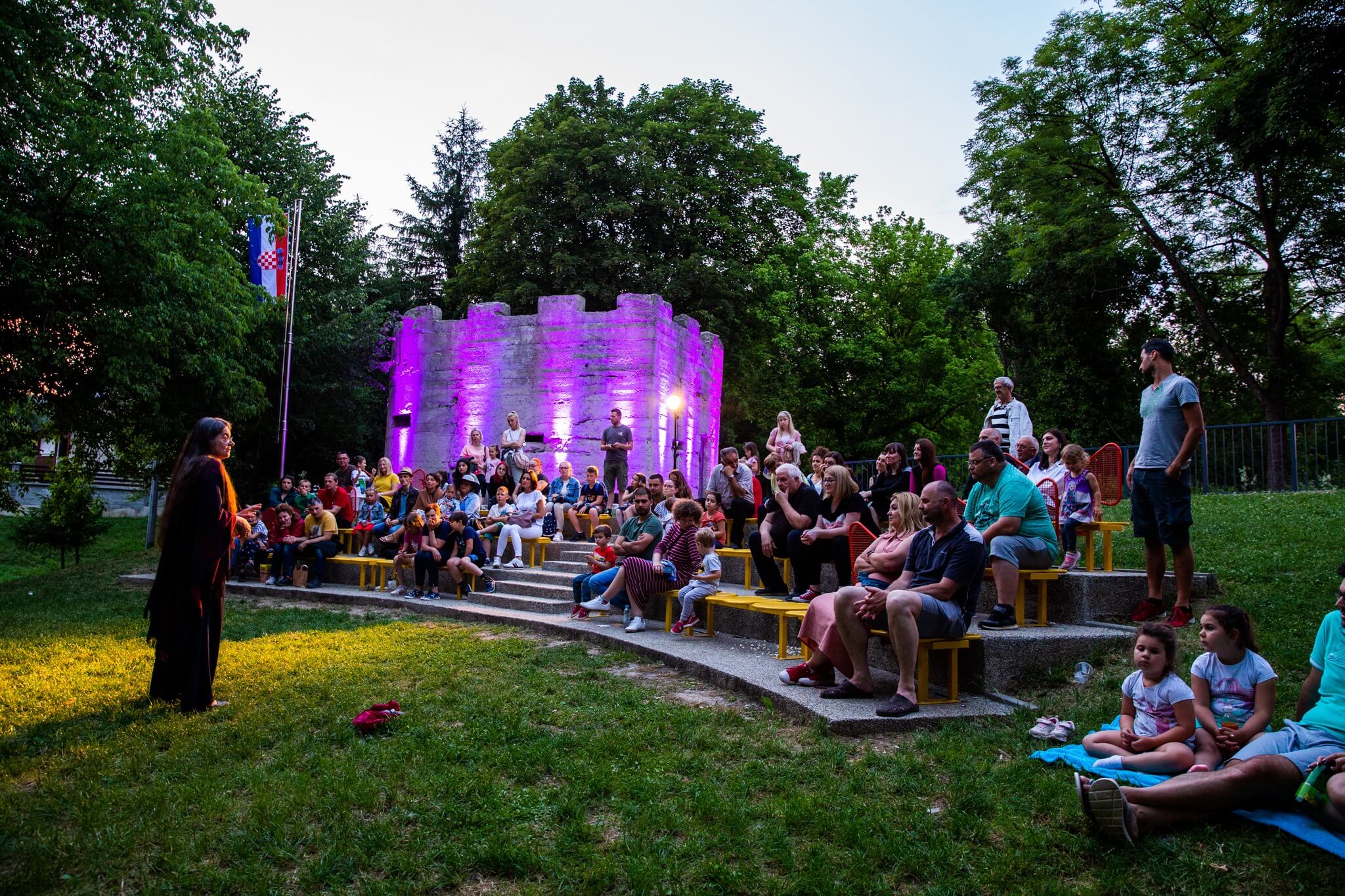
(City of Ogulin Tourist Board)
Ogulin Fairy Tale Festival is an event that is held every year, and this year in two editions: the second weekend in June and the second weekend in September. Due to the epidemiological situation, all the contents take place in the open space in the very center of the city on several scenes bearing the names of characters from the fairy tales of Ivana Brlić-Mažuranić.
The September edition of the 16th Ogulin Fairy Tale Festival will take place from September 10 to 12, and you can find the program at the following LINK.
For more, follow our travel section.
Montenegrin President to Visit Zagreb Next Week
ZAGREB, 10 Sept 2021- Montenegrin President Milo Đukanović is coming for an official visit to Croatia next week at the invitation of his Croatian counterpart Zoran Milanović.
Đukanović is due to arrive in Zagreb on Wednesday, 16 September and meet with Milanović, Prime Minister Andrej Plenković and Parliament Speaker Gordan Jandroković, Hina learned unofficially from the President's Office on Friday.
The visit comes following the inauguration of Serbian Orthodox Church Metropolitan Joanikije in the Montenegrin historical capital Cetinje earlier this month, which sparked protests by several thousand people who blocked the access roads to the city for two days. Seven police officers were injured in clashes, a dozen protesters sought medical assistance and another 14 were detained by the police.
Đukanović said that the violent inauguration was "against the will of the vast majority of the citizens of Cetinje and a considerable number of the citizens of Montenegro", condemning "the inappropriate use of force against peacefully gathered citizens."
Đukanović accused Serbia of humiliating Montenegro and pursuing the policy of territorial expansion in the region. On the other hand, Montenegrin Prime Minister Zdravko Krivokapić, who is close to the Serbian Orthodox Church, blamed Đukanović for initiating the protests in Cetinje.
For more on politics, CLICK HERE.
Police Director Says USKOK Anti-Corruption Operation Refers to Six Persons
ZAGREB, 10 Sept 2021 - National police director Nikola Milina said on Friday that a major anti-corruption operation launched in the northern region of Međimurje on Friday morning by police and the USKOK anti-corruption agency referred to six persons, without saying if one of them is Međimurje County head Matija Posavec.
"The operation refers to six people," Milina said when asked by reporters if Posavec was arrested.
Milina explained that the persons in question were suspected of corruption.
He stressed that major efforts had been invested to fight corruption and that in the first eight months of 2021, 682 crimes of corruption had been reported, over 80% more than in the same period of 2020.
According to unofficial reports, Međimurje County head Posavec was arrested for taking a bribe in the operation launched against six people, including Social Democrat MP and former Čakovec mayor Stjepan Kovač.
They are suspected of bribery, influence-peddling and abuse of office.
The Večernji List daily has reported that Posavec allegedly took a bribe of HRK 10,000 to employ a person.
The parliamentary Privileges and Credentials Commission is expected to meet at 3 pm to decide on USKOK's motion to strip Kovač of immunity.
For the latest news on politics in Croatia, CLICK HERE.
Parl. Committee Postpones Vote on Candidates for Supreme Court Head
ZAGREB, 10 Sept 2021 - The parliamentary Judiciary Committee will vote at a later date on candidates for the Supreme Court president due to a dispute over disciplinary proceedings launched before the State Judicial Council (DSV) against President Zoran Milanović's candidate for the post, Judge Radovan Dobronić.
After five candidates presented their programmes and answered questions from members of the Judiciary Committee for seven hours on Thursday, Committee members decided to postpone the vote at the proposal of MP Krunoslav Katičić of the ruling HDZ party, who said that before taking the vote the Committee should have all information regarding disciplinary proceedings against Dobronić.
The Committee, whose decision is non-binding on the constitutional proposer of the candidate for the Supreme Court head, President Zoran Milanović, on Thursday interviewed Dobronić, Barbara Gundić, Marin Mrčela, Lana Petö Kujundžić and Šime Savić.
Dobronić: Judiciary has lost minimum trust of citizens
In his address to the Committee, Dobronić said that the judiciary has lost the minimum trust of citizens but that it is not true that judges are lazy and that the system is being blocked by a large number of cases.
Between 200,000 and 300,000 cases are related to the state or state-owned companies, he said, noting that the situation could be improved significantly by improving governance at the central and local levels.
Asked by HDZ MP Dražen Bošnjaković how he would deal with the problem of corruption in the judiciary, Dobronić said that more than 90% of judges work in good faith but that the judiciary, as a branch of government, should be 100% vetted.
"No judge must make an omission. The corruption rate among judges is not even 1-2%, but that undermines trust in the system," he said, adding that Croatian judges are also EU judges and their decisions have far-reaching consequences.
Asked by HDZ MP Damir Habijan which measures he would introduce if he was elected Supreme Court president, Dobronić cited reorganisation of the judiciary, education for business people, changes to the system of public notaries, and the reorganisation of work regarding complaints, which, he said, would reduce the number of cases by 30-50%.
Dobronić says learned about disciplinary proceedings from reporters
HDZ MP Marija Jelkovac wanted to know about disciplinary proceedings launched against him for "lack of due diligence in performing his duties as a judge". Dobronić said that he had been informed about the proceedings by reporters and that in 2019, the year in question, he worked on old cases, appeals and other judges' cases and that the time spent on that type of work was not taken into account.
"I do not feel affected by it (disciplinary proceedings) because it is completely beside the mark and wrong," he said, noting that there is an awareness of this problem in the judiciary and that he intends to deal with it by introducing controls of the quality of performance.
Asked by Bridge MP Nikola Grmoja to assess the system of allocation of cases to judges, Dobrinić said that judges themselves do not understand the criteria under which they are given individual cases.
"I do not know if that is abused in individual cases, but the system can be better programmed," he said.
Asked by HDZ MP Ljubica Lukačić what he could do to make the judiciary available to everyone, Dobronić said that the practice of judges writing complaints for citizens free of charge on certain days is a good legacy of the previous, Socialist system and that it could be reintroduced.
Judges must focus on merits of case
Social Democrat MP Vesna Nađ asked Dobronić where he saw resistance and where allies in the implementation of reforms, to which he said that resistance can happen at any level.
He also noted that enforcement judges should focus "on the merits of a case rather than nitpick over every single kuna."
Zlata Đurđević, President Milanović's previous candidate for Supreme Court president and external member of the Judiciary Committee, raised the issue of the State Judicial Council's work.
"It should definitely be defined in a different way. It has never been discussed what to do when someone constantly writes reasonings of judgements that make no sense," he said.
Speaking of uneven court practice, which he considers one of the main issues, Dobronić said that it happens because judges make a large number of decisions, but he recalled that departments have been established to monitor case law and warn a judge if their predecessor has already made a ruling in a similar case.
"Judges should discuss their cases more with one another and share their experience," he said.
Asked by Homeland Movement MP Stephen Nikola Bartulica if he believed that in Croatia the process of lustration had been carried out, Dobronić said that some judges had been treated unfairly in both systems.
Mrčela: Belittling of judges comes from politicians
Presenting his programme, the acting President of the Supreme Court, Marin Mrčela, said that the head of the highest court in the country is neither a radical nor a revolutionary but that he or she can initiate steps to improve the situation in the judiciary.
Noting that his programme contains 39 such measures, he said that there are 22 key problems in the judiciary, singling out the length of proceedings, public perception of the judiciary and the atmosphere in which it is normal to belittle judges' decisions.
In that regard, he also mentioned insufficient economic and human resources, too broad jurisdiction of courts, the platitude about the existence of a judicial clique and the autism of judges, and judges' affiliation to political groups, which he said is untrue.
Mrčela said that the belittling of judges comes from politicians, including high-level ones, and that messages in the media saying that "judges and politicians should be killed" should be taken seriously. "The problems of the judiciary, the length of proceedings, immorality and even corruption, should not be cause for political influence on the judiciary."
Asked by Dražen Bošnjaković (HDZ) whether the legal provision on legal protection and allowing the Supreme Court to standardise case law of criminal courts should be changed, Mrčela said that he does not agree with the proposal by former Supreme Court President Đuro Sessa that it should be changed. "We only need to leave open the possibility for the Supreme Court to standardise case law using extraordinary remedies, as has been the case so far."
Independent MP Karolina Vidović Krišto was interested in Mrčela's opinion on civil society organisations that protect victims of paedophilia, which claim that sentences handed down by the Supreme Court against paedophiles are too lenient. "I will personally advocate for all criminal cases to be analysed. Punishment must not be an expression of anger, but of careful thinking on the part of judges in deciding on a sentence," Mrčela said.
Speaking of the length of proceedings, Mrčela said that court presidents have the authority to order a case to be dealt with within the shortest time possible, and that such deadlines should be instructive. He concluded by saying that it would be good if politicians did not comment on specific cases.
High Criminal Court Judge Lana Petö Kujundžić said while presenting her programme that the Supreme Court must be efficient, fast and expeditious in dealing with cases and that it must use its authority to make this possible for other courts as well. She stressed the importance of all courts having equal technical equipment, and added that courts must be more open to the public in order to change public perception of the judiciary. She expressed concern about judicial administrative staff being underpaid.
Presenting his programme, Zagreb lawyer Šime Savić commented on the assessment made by the general session of the Supreme Court that he is insufficiently competent for the post of Supreme Court President. He said that with his election the Supreme Court would get the best president. As the only candidate to have responded to all three public calls for applications, at the end of the marathon hearing he said that they would meet again for a forth time.
A candidate for Supreme Court President is proposed by the President of the Republic after a prior advisory opinion from the parliamentary Judiciary Committee and a general meeting of the Supreme Court. At the Supreme Court's general meeting held early this month, Mrčela received 29 votes, Dobronić received four, while the other candidates did not receive any votes.
Milanović has said earlier that Dobronić, who is known for his judgment against banks in the case of CHF-denominated loans, is his candidate, while the parliamentary majority has announced that they will decide on the candidates after the decision by the Judiciary Committee and the general meeting of the Supreme Court.
For more on politics in Croatia, CLICK HERE.
FlixBus: More Than 70% Passengers Returned In 2021 From the Record 2019
September 10, 2021 - FlixBus, the leading bus carrier in international passenger transport in Croatia, recorded a strong increase in the number of passengers on all routes in the summer season of 2021, returning more than 70 percent of passengers from the record 2019.
HrTurizam reports that the German company Flixbus, a leader in the bus market that connects destinations within Croatia as well as the rest of Europe, has achieved very positive numbers and that they have little to envy a record season like that of 2019. FlixBus, as announced before the season, connected all international destinations that it connected in 2019, and in the period from June 1 to August 15, it carried 40 percent more passengers than in the same period in 2020.
The most pleasant surprise of the season were domestic passengers, who traveled within Croatia in almost the same number as in 2019. From other countries, most passengers were recorded from Germany, whose return is in line with the total figures, at a level higher than 70 percent from 2019. In the top 10 are Austrians, Slovenes, Italians, Hungarians, followed by travelers from Serbia, the Czech Republic, Bosnia and Herzegovina, Slovakia, and Switzerland.
From Italy, extremely affected by the pandemic, four times more passengers were recorded this year than in 2020. Despite stricter epidemiological measures for the entry of citizens from outside the European Union, and the severance of connections with Croatia in 2020, all tourists returned this season. Serbia with additional growth of 8 percent compared to the record 2019 when FlixBus connected Serbia and Croatia for the first time.
"The results of FlixBus during this year's summer season have once again confirmed that there is no successful tourism without quality transport connections. It is my great pleasure that as a company that brings together Croatian carriers, we have enabled a large number of foreign and domestic tourists to travel safely and comfortably on vacation, as well as to confirm the business justification of connecting all previous destinations, including those due to the 2020 pandemic. "It didn't work," said Ante Grbeša, director of the FlixBus CEE South region.
Unfortunately, in the year of recovery from a significant drop in traffic in international and domestic transport last year as a result of the coronavirus pandemic, some domestic carriers this year continued to use the option of keeping non-operating lines for epidemiological measures.
This resulted in poorer connectivity for passengers, while at the same time carriers such as FlixBus and other Croatian carriers were not allowed to introduce new routes and new destinations within Croatia that were in demand. This situation caused negative consequences for the freedom of market competition, and above all for the mobility of Croatian citizens, but also their guests in the middle of the tourist season.
The positive trend in passenger transport is due to strong growth in demand, especially since mid-July. In that sense, the decision of the MMPI on the application of the European Regulation on Internal Transport is certainly to be welcomed, according to Flixbus.
Thanks to their efforts and the application of the legal provisions of EU regulations that deal with the area of passenger transport within the EU, it is possible to purchase tickets and transport passengers between Croatian cities on international routes, which was previously prohibited. Such a possibility strengthens the connection of domestic destinations, offers more departure options for passengers and certainly better prices, and has a positive effect on the environment due to the greater efficiency of the bus, conclude Flixbus.
New lines announced
From September 15, FlixBus will introduce new European lines in addition to the existing ones, so it will be possible to reach Dalmatian cities via Split directly from Brussels and Hanover, while Zadar will be connected with Berlin and Maastricht. It will also be possible to travel to Zagreb from Antwerp and Amsterdam, and from Amsterdam, it will also be possible to travel directly from Slavonski Brod, which also connects with Frankfurt. The county will be connected with Antwerp and Bonn.
Since entering the domestic market in 2016, FlixBus, with its 12 local partners, more than 140 buses, and 700 drivers, has connected more than 250 destinations across Croatia and Europe and enabled direct travel to 12 countries, which has encouraged higher inflows and mobility tourist.
For more information on bus travel in Croatia, take a look at the Total Croatia page.
For more, make sure to check out our dedicated travel section.
HPK: Livestock and Milk Production Sectors Face Collapse Without Speedy Measures
ZAGREB, 10 Sept 2021 - The Croatian Chamber of Agriculture (HPK) said on Friday that without concrete and swift measures from the government livestock and milk production would collapse.
The HPK announced that next week it would again organise meetings of all six committees relating to the livestock sector to examine the situation and propose urgent measures to prevent a collapse of livestock and milk production.
This year has been extremely hard for livestock farmers, whose position on the national and common market is currently affected by the adverse impact of the COVID-19 crisis, the HPK said.
"This year has seen a dramatic rise in prices of raw materials on the global market, including in Croatia. Livestock farmers have seen their costs rapidly increasing since the start of the year, while at the same time they have been selling their products below the asking price because on the common market commodities are offered at dumping prices because of surpluses caused by the COVID-19 crisis," HPK president Mladen Jakopović said.
He added that the structural problems in the national livestock sector and the sharp rise in input prices were compounded by a drought and, in some areas of the country, by the consequences of last year's earthquakes.
A study by the Osijek Faculty of Agrobiotechnical Science has shown that input prices, notably the cost of animal feed, had accounted for about 50% of material costs before their jump in 2021, while currently they exceed 70% in certain sectors. This has resulted in higher prices of cereals, processed cereals and animal feed as well as in losses to the livestock sector.
For more on business, CLICK HERE.
Croatia Reports 1,042 New Coronavirus Cases, 8 Deaths
ZAGREB, 10 Sept 2021 - Croatia has registered 1,042 new coronavirus cases and eight COVID-related deaths in the last 24 hours, the national COVID-19 response team said on Friday.
The number of active cases currently stands at 5,691. Among them are 552 infected people who are receiving hospital treatment, including 59 patients who are on ventilators.
Since 25 February 2020, when the first case was reported in Croatia, 381,949 people have been registered as having contracted the novel virus, of whom 8,413 have died and 367,842 have recovered, including 678 in the last 24 hours. Currently, 11,647 people are self-isolating.
To date, 2,638,469 people have been tested for COVID-19, of whom 10,353 in the last 24 hours.
By 9 September, 3,321,265 COVID-19 vaccine doses had been administered, with 43.24% of the total population, or 51.92% of adults, having been vaccinated.
A total of 1,754,731 persons have received at least one dose of a vaccine and of them 1,643,710 have been fully inoculated (1,566,534 persons have received two doses and 77,176 have receive the single-dose Jannsen vaccine), which is 48.70% of the adult population.
For more news, CLICK HERE.
Promising Croatian Footballer Lovro Zvonarek Signs with Bayern Munich at 16
September 10, 2021 - The weeks-long negotiations have finally ended to the satisfaction of all parties: Lovro Zvonarek has signed for Bayern Munich and will remain on loan at Slaven Belupo until the end of this season!
It is a denouement in which everyone is satisfied - Bayern swooped in on the promising young Croatian talent, and Zvonarek, in addition to signing a contract with the Bavarian giant, got the much-needed peace to continue developing his football career. Furthermore, with compensation of 1,800,000 euros, the Koprivnica club managed to keep their #10, reports Gol.hr.
Bayern will immediately pay the mentioned amount to Podravka, and the compensation may eventually increase to five million euros over the next few years. This will depend on when Zvonarek makes his debut for Bayern's first team, his performance, and other details built into the contract.
Zvonarek was born on May 8, 2005, in Prelog, where he started playing football at the Mladost Prelog club.
His phenomenal talent was first noticed by Slaven Belupo, who, five years ago, when he was 11, brought him to Koprivnica, from which he later moved to the youth division of the Koprivnica first league.
Zvonarek gives the most as an offensive midfielder, but can also play on both wings.
At the end of last season, Zvonarek made his debut for the Slaven Belupo first team, and made history in the last round, becoming the youngest scorer in the history of the Croatian First League. At 16 years and 14 days, he scored the only goal in the Slaven Belupo - Varaždin match and broke the previous record held by Alen Halilović.
"Lovro Zvonarek is the new player of the German great FC Bayern Munich, and he will stay in our club until the end of the current season!!!
Congratulations to the youngest debutant in the history of Slaven Belupo at only 16 years and four days and the youngest scorer in the history of the HNL at only 16 years and 14 days on the biggest transfer in the history of our club!" wrote Slaven Belupo in their Facebook page.
To follow the latest sports news in Croatia, follow TCN's dedicated page.
To learn more about sport in Croatia, CLICK HERE.
How a Split Photographer Scooped Soviet Brezhnev Funeral World Exclusive
September 10, 2021 - Continuing our look at the exploits of world-famous Split photographer Jadran Lazic and his behind-the-scenes stories of capturing the biggest names and events, how the man from Split became the only Western-accredited photographer at the Soviet leader Leonid Brezhnev funeral back in 1982.
These days, celebrity photographer Jadran Lazic can be found at home among his beloved lavender fields on the island of Hvar, reflecting on a glittering career being the camera spanning over 50 years. In addition to snapping some of the world's biggest names, he has also racked up some impressive world exclusives over the years, as well as befriending several celebrities - it was Lazic who brought a young Jodie Foster to Hvar for a holiday back in the 1970s, for example.
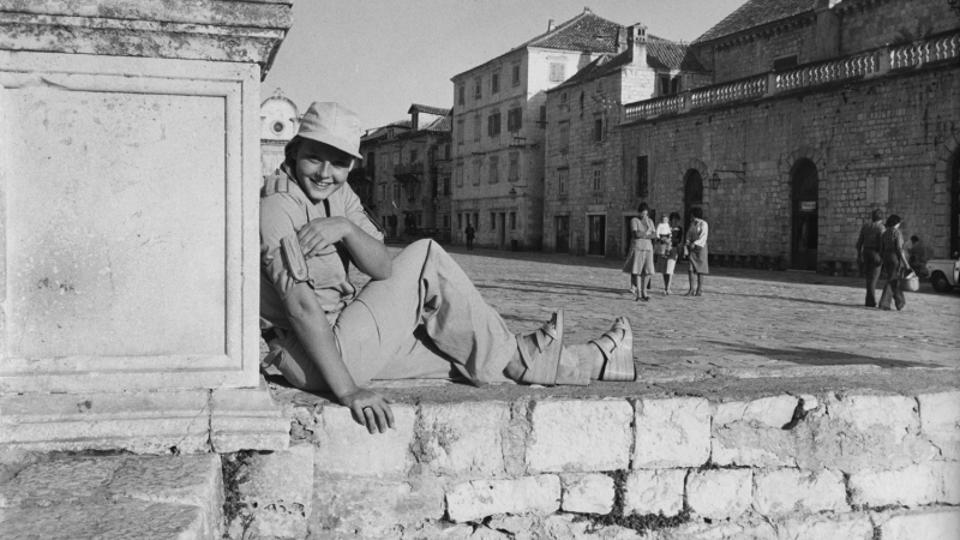
Earlier this year, TCN covered the extraordinary story of how Lazic tracked down and photographed wanted Palestinian terrorist and architect of the Achille Lauro hijacking, Abu Abbas, to a Belgrade apartment.
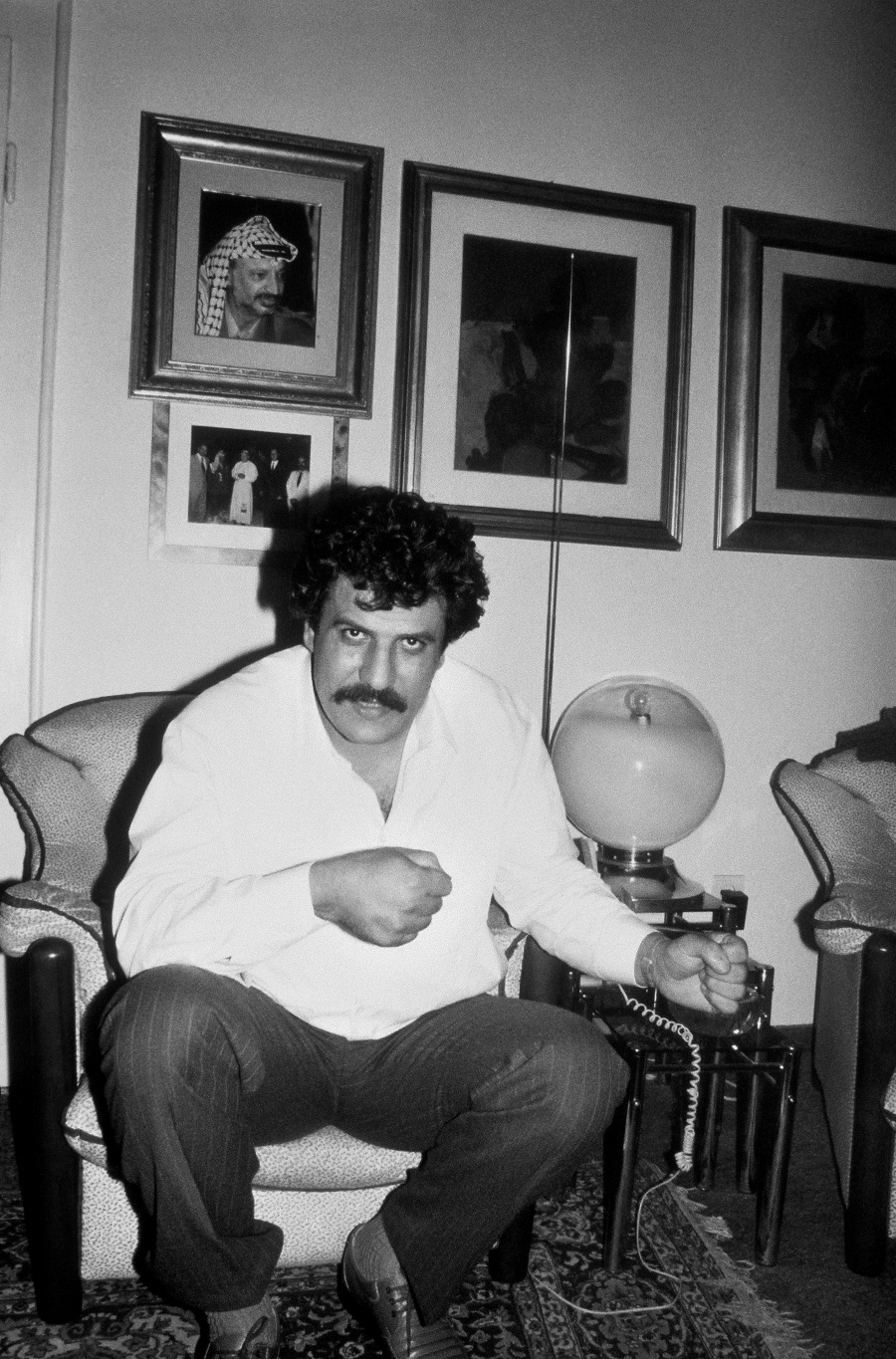
That exclusive took place in 1985, some three years after perhaps an even bigger achievement - the only photos by a Western-accredited agency from the Leonid Brezhnev funeral back in 1982. Photos which would sell for an impressive US$300,000 in 1982 currency (almost US$850,000 today), and would enable the Split snapper to buy his dream home on the water in Zavala on the island of Hvar, where he divides his time with Los Angeles and looks after his olive and lavender fields. As with the Abu Abbas story, Lazic's success was a mixture of charm, determination, ingenuity, and luck.
Lazic was living in Belgrade back in 1982, working for Paris-based photo agency, SIPA. Communications back in those days were a world apart from the instant digital age of today, and he did not even have a phone in his apartment, which was a major disadvantage for a breaking news photojournalist. As such, he tended to hang around the post office a lot to have better access to communications.
A few weeks before the Soviet leader died, things were fairly quiet, and Lazic decided to be proactive in creating stories to cover. From the post office, he called his boss in Paris and they agreed that he would try and cover the upcoming annual October Revolution Parade in Moscow. This was the height of the Cold War, and Western media access was restricted, but entry for citizens of Socialist Yugoslavia was a lot more relaxed. Lazic was unsure whether or not to apply as a local freelance reporter or an official SIPA photographer. He made the wrong choice with the SIPA route, and his request was politely declined, as it would now be if he applied the same way in the future.
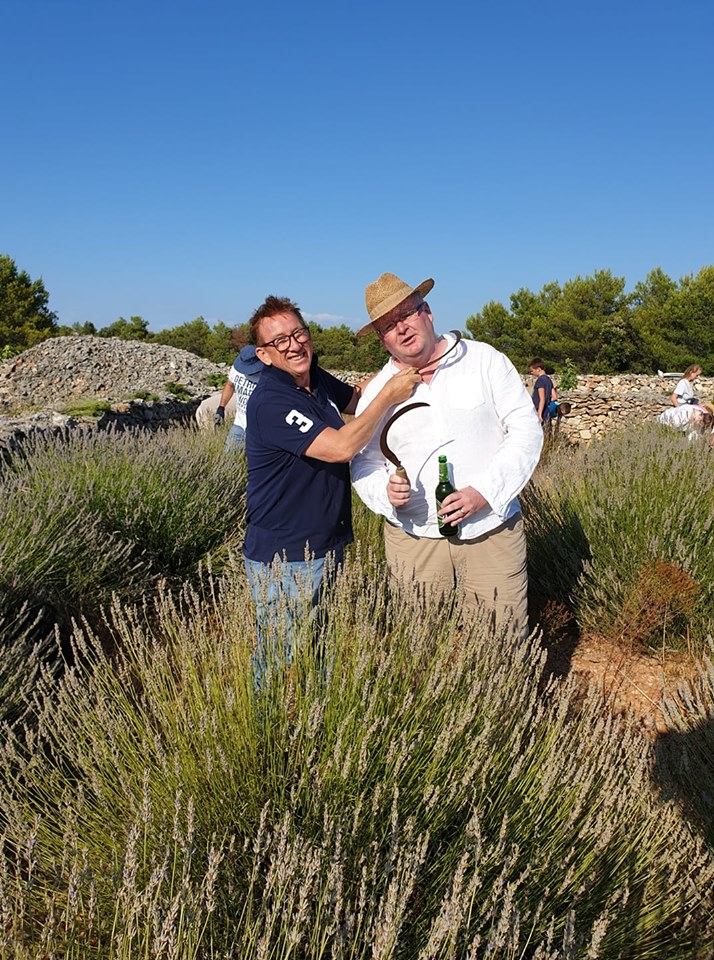
(Jadran Lazic today, with the author. The only association to th Hammer and Sickle these days is during the annual lavender harvest on Hvar)
A few weeks later, he was driving his daughter to her Belgrade kindergarten, when he heard the news that the Soviet leader had died. He knew that he had to go and cover the event and headed straight to the post office to get permission from Paris. With official approval from France, now came the tricky bit - how to get permission to enter Russia after his recent unsuccessful embassy application?
Lazic called the editor of a Yugoslav magazine and asked if they would be interested in sending a reporter to cover the story if he accompanied the journalist, covered his own costs, and gave his photos to the magazine for free, in return for a letter naming Lazic as the accredited photographer to the journalist. The editor agreed, a business visa was obtained, and both were on the next flight to Moscow from Belgrade with Aeroflot at 10:30 the following day.
The plane never reached its destination. A rough flight with plenty of turbulence was eased somewhat by the bottle of scotch the two of them shared on the flight, but it was clear from the constant turning that something was wrong, and the flight time was a lot longer than advertised. There was no announcement from the flight crew, and all was only revealed with the plane finally touched down at... Kiev - Borispol in Ukraine.
The official explanation for the diversion was bad weather in Moscow, although it was more likely due to the chaos surrounding the impending Brezhnev funeral and its logistics.
Lazic was feeling uneasy. He was technically in the Soviet Union, but probably several checkpoints away from his end destination of Moscow. Prior to his departure, Paris had informed him that no foreign journalists were being allowed in, and so the agency was depending on him. As one of the only (perhaps the only foreign-accredited photographer), this could be a huge opportunity for the agency.
His colleague passed through without problems and was seeing striking up a conversation with two ladies while Lazic awaited his turn anxiously. The USA visa in his passport elicited a frown from the border guard, who called his superior. Lazic produced the letter from the Yugoslav editor and sweated while they pored over it and discussed his fate. Having searched his things and gone through the papers and magazines he was carrying, and having checked how much money he had, they let him through.
His colleague had not been idle in the meantime. By chance, one turned out to be the wife of the Sarajevo daily, Oslobodjenie. She was to play a crucial role when they finally landed in Moscow at 10pm that evening.
Moscow was chaos. There was no press centre to help arriving journalists, so finding accommodation was going to be a challenge at this late hour. Even more so as there were no taxis and the last bus into the centre had long gone. As her husband was currently in Belgrade, the Sarajevan wife kindly offered them both a place to stay, and a lift into town was secured by his colleague, who managed to find a Japanese trade representative with enough space in his Lada for all of them. The Brezhnev funeral was one step closer.
Arriving at the apartment at 1am, there was no time for sleep. Representatives of the official Yugoslav news agency, TANJUG were also living in the building, and Lazic got into earnest conversation to see how he could get to Brezhnev. The TANJUG team was very pessimistic about his chances, given that they themselves had only received one funeral pass from two applications.
Thanks to the help of their new TANJUG friends, a letter of recommendation was procured from the Yugoslav Embassy in Moscow, which brought the Belgrade Two to the Soviet Ministry of Foreign Affairs. Every now and then, one did encounter a friendly and helpful public official in the Soviet Union (I encountered three in my time there), and Lazic had a slice of luck in this case.
The official said that their chances were slim, but he would see what he could do, advising them to head to the Trade Union Hall with the permanent correspondents, where Brezhnev's body was lying in state. The official would then inform the staff there to let them enter.
They were driven to the Trade Union Hall by the permanent correspondent of Yugoslav daily, Borba, who was well-versed in negotiating checkpoints and the Soviet bureaucratic system. And upon arriving, they were welcomed by a friendly face - the helpful official from the Ministry of Foreign Affairs. Not only did he instruct the staff to let them enter, but he assigned two security officers to take them through the back corridors to avoid the line of journalists so that they could see Brezhnev lying in state alone.
"You have one minute, then you must leave."
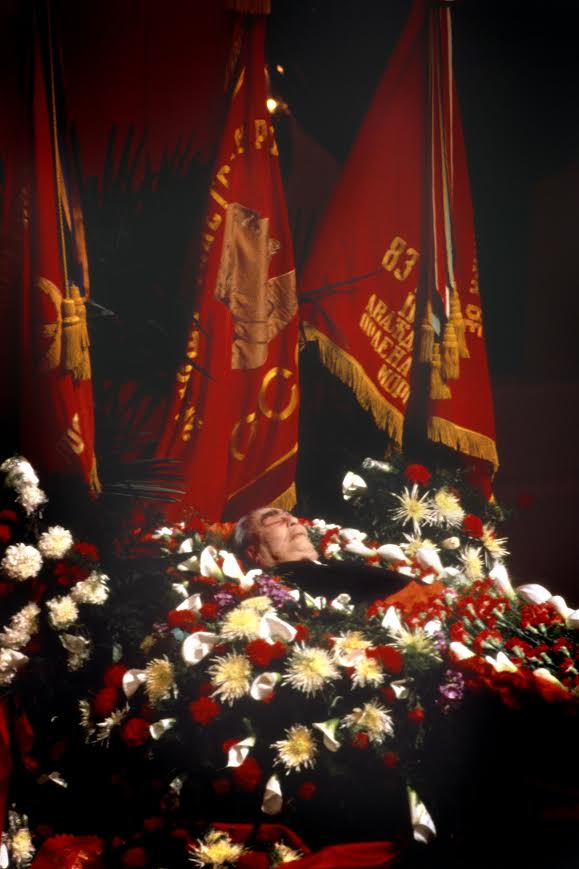
Snap. Snap. Snap. Lazic got to work, shooting as much as he could in the short time allocated, and ignoring pleas to stop and to leave. He would only stop when they physically removed him, which they did after a couple of minutes. He had got the first part of his exclusive. How he would get the pictures to Paris was a problem to be resolved in the future.
While he had great shots of the body lying in state, by jumping the queue, he had missed the chance to shoot the late Soviet leader's family, but he got his chance the following day. The following day also started brightly for another reason, as one of his new TANJUG friends had somehow managed to obtain a pass for Lazic for the Brezhnev funeral cortege.
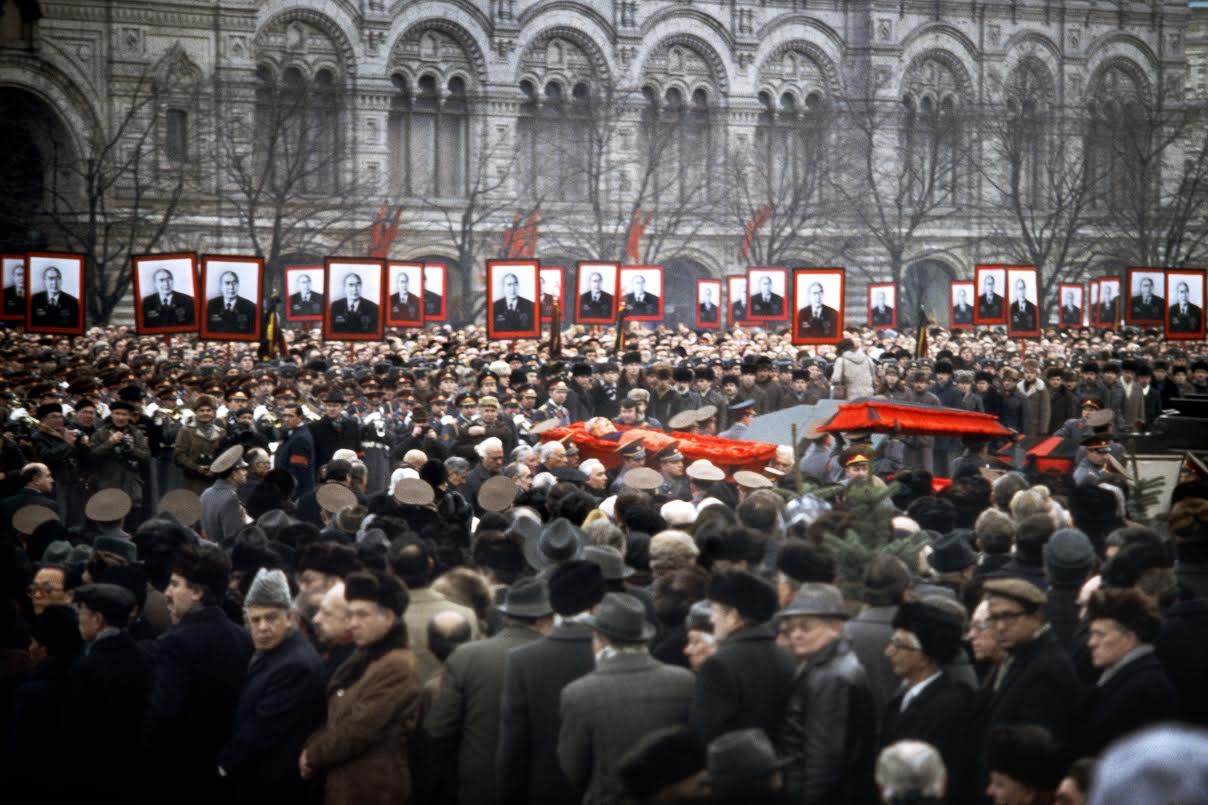
Security was tight, and nobody without a pass could enter within a 4km radius of Red Square. After endless checkpoints, Lazic eventually reached Red Square which was already filled with mourners. Trying to get closer to the mausoleum proved impossible, as security guards were blocking everything. Even the offer of a US$100 for a guard to look the other way failed. In desperation, Lazic retreated and climbed to the highest point he could in one part of the square. He would have only a moment to shoot as the cortege passed, and the shot would be through a crowd so would require some skill, but it was the best he could do.
The Brezhnev funeral cortege moved slowly towards its end destination of the Kremlin necropolis, but there was still only time for 5-6 shots. And having taken those, his job was done. While everyone else continued to take part in the funeral, Lazic had a plane to catch to Belgrade, and photos to send to Paris.
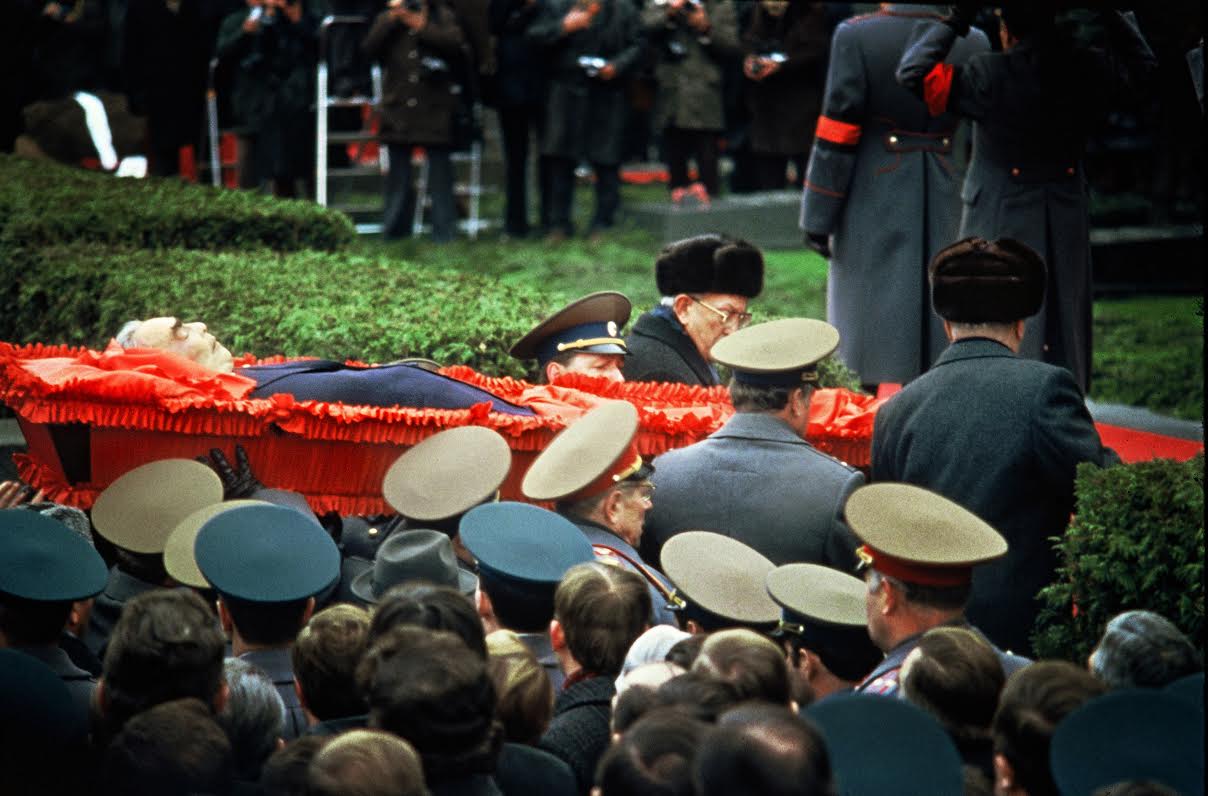
But first he had to get through the checkpoints of the Soviet authorities. He knew he had a bombshell, which would please his bosses in Paris, but he was not sure how Soviet border guards might feel if they discovered what he had with him. He decided to take some precautions.
Back at the apartment, he wrapped the precious film in aluminium foil and put them in the carton boxes for unused film rolls, then put the unused rolls into his cameras to pretend that they were already exposed. This was a precaution against X-rays and a border guard's decision to destroy the film in his camera.
His journalist colleague Slavko went first and passed through without a hitch with his luggage. Lazic was panicking internally, but started to relax once his luggage too passed unhindered. He was almost home, but it turned out he started to relax too early.
BEEP! Much to his surprise, as he had no metal on his person, the scanner beeped and he was frisked. After some time, an offending nail clipper was found in his jacket - it must have slipped through a hole in the pocket.
The nail clipper may have been an innocent explanation, but that did not mean that the Soviets were convinced of his innocence, and he was taken to a room for questioning. Foreigners visiting the Soviet Union were required to report the amount of foreign currency they had on entry and departure, as well as receipts from any official purchases. This was done to control illegal exchange to roubles in the black market, where the exchange rate was much higher.
Lazic showed them the money he had, as well as the official receipts for the two fur coats he had bought for his daughter from the beryoska hard-currency store, but he did not have the declaration from his arrival in Kiev. In all the confusion, it had been overlooked.
The border official left the room to consult with his superiors.
And then, a moment which required a dramatic and fateful decision. Looking through a curtain, he saw his bag a few metres away. Ten steps from there, the tunnel to the Belgrade flight. What the hell, he thought. If he could at least get the film to Slavko to forward to Paris, his trip would not be in vain. Confidently, and without a second thought, he strode out, grabbed his bag, and headed down the tunnel. He was waiting for a shout, a whistle, a firm grip on his shoulder from a guard.
But there was none.
Aboard the plane, he quickly informed Slavko what would be required of him, in case the Soviets boarded the plane:
“In case they come for me, take these films. Here’s the address of Sipa Press. When you arrive in Belgrade, send the films to Paris as soon as possible!”
No border guards boarded the plane, and after a few anxious minutes, the cabin door closed, and soon they were airborne. Destination Belgrade. He had done it.
Almost.
Belgrade was not Paris. The usual protocol for getting his film to Paris was to go to the airport, find a sympathetic-looking passenger and ask them to carry the film to Paris, where a SIPA representative would be waiting at passenger arrivals. Hardly a system that would work today...
Although the system worked very well, the stakes were higher with this assignment, and Lazic decided to fly straight to Paris, accompanied by the film and his daughter's fur coats. He had something the world wanted to see, and time was of the essence.
He knew that he had something very valuable, but it was only on arrival that he realised quite how valuable. Usually, the agency sent a courier to collect the film from the airport, but Michel Chicheportiche, the agency's head of sales and the director's most trusted lieutenant, was there to meet him. THAT had never happened before.
When he confirmed he had the films with me, Chicheportiche excused himself and went to the nearest payphone to call his boss. Three minutes later he returned with a generous offer:
"The boss is offering you his personal Mercedes in exchange for the film." Quite an opening offer, and one which the man from Split was prepared to play with.
“What good for me would a Mercedes with French license plates be in Yugoslavia? The customs duty and vehicle registration alone would cost me as much as another Mercedes.”
Another visit to the pay phone, short conversation, and then enhanced offer. The boss would cover all the costs of customs, registration, and taxes.
Now Lazic was sure he was onto something. Declining the latest offer, he suggested that they head into town and negotiate directly with the boss, settling finally on a 50/50 split of the proceeds of the sale of the photos.
As the only Western-accredited photographer there, the photos were sold all over the globe, and young Lazic was handsomely rewarded for his efforts.
And that is how the story of the Hvar's most beautiful lavender field started.
But that is another story...
No Quarantine for Tourists Returning from Croatia, For Now
September 10, 2021 - As it currently stands, there is no quarantine for tourists returning from Croatia, even though the country turned red on yesterday's new ECDC corona map.
Even though Croatia is red on the European Center for Disease Prevention and Control (ECDC) corona map, thanks to the standardization of travel processes within the EU, tourist flows continue, reports HRTurizam.
The same or similar rules apply to most countries depending on the epidemiological situation in individual countries. Therefore, regardless of Croatia being in the "red", tourists who return to their home countries do not currently need self-isolation but must present a negative PCR or rapid antigen test if they are not vaccinated.
"A favorable epidemiological situation is a precondition for the best possible development of social and economic events. More than half a million tourists are still staying in Croatia, which is more than in the same period in 2019. This should be an incentive and a reminder to everyone that with responsible behavior, tourism can still achieve excellent results. Therefore, I call on everyone to continue to adhere to epidemiological recommendations and vaccinate as many as possible to protect themselves and everyone living in Croatia," said Minister of Tourism and Sports Nikolina Brnjac when the new ECDC map was released.
To provide all travelers with everything they need on their journey, taking into account travel during the COVID-19 pandemic, an additional 350 test points have been set up across the country so that, if necessary, all tourists can be tested in accessible locations before returning to their home countries.
The Ministry of Tourism and Sports has provided the distribution of one million and 81 thousand tests at more favorable prices for tourists who spend three or more nights in commercial accommodation, and the purchased tests were distributed to the county public health institutes. Also, given the conditions on crossing borders and the interest of vaccination in tourists, vaccination in Croatia is possible for foreign citizens.
Director of the Croatian National Tourist Board Kristjan Staničić also commented on the impact of the new ECDC map:
“We do not expect that the new map will significantly affect tourist flows in the country, especially if we know that certain markets are important. Furthermore, the Czech Republic, the Netherlands, the USA, etc., have their own methodology system for monitoring and publishing travel recommendations, according to which Croatia is still a safe destination. However, I hereby appeal that we all continue to adhere to the prescribed epidemiological measures and to vaccinate in as many numbers as possible to achieve the best possible tourist results by the end of September and in October," said Staničić and stated that the tourist results in the previous part of the year, in which almost 73 million overnight stays have been realized so far, confirm that the tourist season in Croatia is very successful.
According to current data, about 550,000 tourists are currently staying in Croatia, while in the record-breaking 2019, about 470,000 were in the country at this time. By the way, more than 70% of the population in the EU is vaccinated, which means that most Europeans can travel without restrictions.
For all you need to know about coronavirus specific to Croatia, including travel and border rules, as well as the locations of vaccination points and coronavirus testing centres located up and down the country, make sure to bookmark our dedicated COVID-19 section and select your preferred language.


